Who would have thought such a small creature was capable of such destruction? Not only can damage by squirrels be extensive, it can also be extremely costly. In fact, in Fort Wayne, Indiana in 2014, a squirrel caused more than $300,000 in damage to a community center that was about to open. The squirrel got into the building and then chewed through electrical equipment, which caused a power surge damaging the boiler room as well as the heating and air conditioning. This is just one of many stories of an unruly squirrel causing significant damage to a home or business.
How Can Squirrels Do So Much Damage?
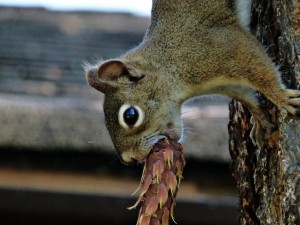 Squirrels have front teeth that continually grow throughout their lives. In order to keep their teeth a manageable length, squirrels naturally chew (anything!) to cut them down. Squirrels naturally try to trim their teeth on things such as pine cones, acorns or other hard nuts and seeds from trees. Things can become problematic when squirrels do not have natural options available to them to chew on.
Squirrels have front teeth that continually grow throughout their lives. In order to keep their teeth a manageable length, squirrels naturally chew (anything!) to cut them down. Squirrels naturally try to trim their teeth on things such as pine cones, acorns or other hard nuts and seeds from trees. Things can become problematic when squirrels do not have natural options available to them to chew on.
Squirrels can chew through just about anything. They have been known to chew through 4x6s, electric wire, roof shingles, outdoor patio furniture, home siding, barns, doors, grills, even parts of cars! This type of damage to your home and property can not only be extremely aggravating, but if you don’t eliminate the squirrel threat, it can continue to happen again and again. This can really add up financially.
How to Minimize Squirrel Damage
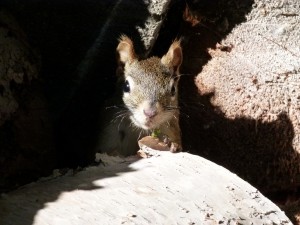 Squirrels may be small and quick and sneaky, but they can be outsmarted and removed from your home. There are several options to rid your home or business of squirrels including live traps and squirrel repellent. You may also consider using welded wire that a squirrel cannot fit through to cover unsightly holes in areas like barns or sheds where immediate repair isn’t needed.
Squirrels may be small and quick and sneaky, but they can be outsmarted and removed from your home. There are several options to rid your home or business of squirrels including live traps and squirrel repellent. You may also consider using welded wire that a squirrel cannot fit through to cover unsightly holes in areas like barns or sheds where immediate repair isn’t needed.
Live traps should be left to professionals. Attic Solutions employs trained professionals who can assist you by setting live traps and humanely releasing the squirrels in the wild. Contact us online or call us at 847.464.1861 the moment you notice damage and we will make it our top priority to stop your squirrel nuisance.




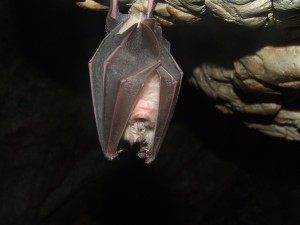
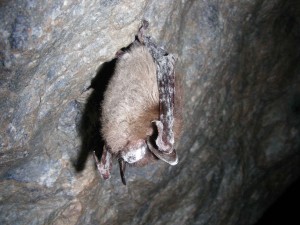

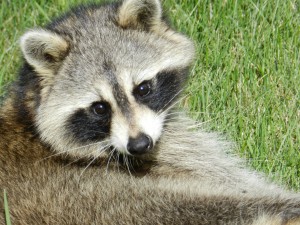 Just like humans,
Just like humans,  True hibernators have a considerably lower heart rate, have almost no respiration and only take a couple of breaths per minute. Skunks do not have these drastic drops in heart rate or respiration. Skunks do prepare for winter in similar ways as hibernating animals though. They eat large amounts so that during the long naps they do take they can survive on their fat stores.
True hibernators have a considerably lower heart rate, have almost no respiration and only take a couple of breaths per minute. Skunks do not have these drastic drops in heart rate or respiration. Skunks do prepare for winter in similar ways as hibernating animals though. They eat large amounts so that during the long naps they do take they can survive on their fat stores.
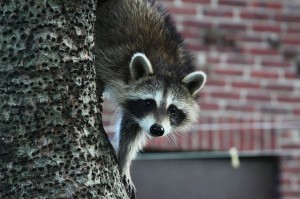
 Raccoons are certainly not picky eaters; in fact they will eat just about anything. Raccoons are carnivores as well as scavengers. The mainstays of their diet include mice, crabs, fish, frogs, nuts, and seeds. They also love to get into food that humans leave behind. This is why you may find your garbage strewn about if you leave it out overnight.
Raccoons are certainly not picky eaters; in fact they will eat just about anything. Raccoons are carnivores as well as scavengers. The mainstays of their diet include mice, crabs, fish, frogs, nuts, and seeds. They also love to get into food that humans leave behind. This is why you may find your garbage strewn about if you leave it out overnight.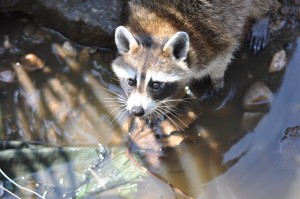 Perhaps one of the most unusual habits raccoons have is dunking their food in water before eating it. The raccoon’s scientific name is procyon lotor, which actually means “washing bear.” This makes sense considering their odd food-washing habit and bear-like markings. Raccoons are nocturnal animals, meaning they are active at night. Most raccoons spend the day in their dens and as soon as dusk approaches, they head out in search of food. Some places raccoons like to search include farms (crops are a big hit with them), ponds, lakes, and of course your garbage can. As sunrise approaches, raccoons typically call it a night and head back to their den to sleep.
Perhaps one of the most unusual habits raccoons have is dunking their food in water before eating it. The raccoon’s scientific name is procyon lotor, which actually means “washing bear.” This makes sense considering their odd food-washing habit and bear-like markings. Raccoons are nocturnal animals, meaning they are active at night. Most raccoons spend the day in their dens and as soon as dusk approaches, they head out in search of food. Some places raccoons like to search include farms (crops are a big hit with them), ponds, lakes, and of course your garbage can. As sunrise approaches, raccoons typically call it a night and head back to their den to sleep.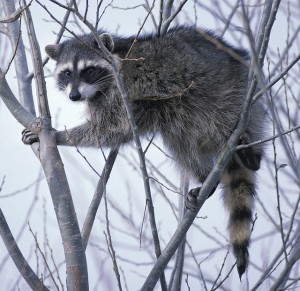 Raccoons do not hibernate in winter. This myth may have started because during very cold days raccoons take refuge in their warm dens. Depending on the climate and weather, raccoons may spend weeks in their dens, living off of their fat stores, until the climate becomes somewhat more mild. When raccoons are sleeping off the cold temperatures, those fat stores keep them alive since they do not eat. This is why raccoons seem to be particularly troublesome in the spring; they’re starving and they want YOUR garbage!
Raccoons do not hibernate in winter. This myth may have started because during very cold days raccoons take refuge in their warm dens. Depending on the climate and weather, raccoons may spend weeks in their dens, living off of their fat stores, until the climate becomes somewhat more mild. When raccoons are sleeping off the cold temperatures, those fat stores keep them alive since they do not eat. This is why raccoons seem to be particularly troublesome in the spring; they’re starving and they want YOUR garbage!